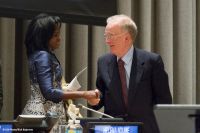
Dr Helena Ndume of Namibia, the first-ever woman recipient of the Nelson Mandela Prize. Photo by UN Photo/Rick Bajornas
The United Nations General Assembly on Friday, 24 July, marked Nelson Mandela International Day – which is observed on 18 July – by awarding the first-ever UN Nelson Rolihlahla Mandela Prize, recognizing the South African leader’s contributions to democracy, justice and reconciliation and his dedication to the service of humanity.
“Nelson Mandela International Day is a global call to action for all citizens of the world, to take up the challenge and follow in the formidable footsteps of Madiba; a man who transformed his life, served his country and freed his people,” General Assembly President Sam Kutesa told an informal meeting of the 193-member body.
The prize, he explained, was designed to honour and recognize the “outstanding achievements” of two distinguished individuals, one female and one male, who have dedicated their lives to the service to humanity, particularly in the promotion of reconciliation, social cohesion and community development.
The first two laureates of the prize are Dr Helena Ndume of Namibia and Jorge Fernando Branco Sampaio of Portugal. Dr Ndume of Namibia is an ophthalmologist whose life’s work has been the treatment of blindness and eye-related illnesses, both in Namibia and throughout the developing world.
Sampaio became a leader in the struggle for the restoration of democracy in Portugal, and served as deputy minister for external cooperation; as mayor of Lisbon from 1989 to 1995; and, from 1996 to 2006, as president of the country.
The prize was also established to pay homage to Mandela’s extraordinary life and legacy of reconciliation, political transition and social transformation.
“Nelson Mandela inspired the world, inspired all of us,” said UN Secretary-General Ban Ki-moon in remarks delivered by his Chef de Cabinet, Susana Malcorra. “Although he suffered terrible atrocities, ‘Madiba’ never sank to the level of his oppressors; instead, he rose to the moment in history.”
The United Nations no longer has apartheid on its agenda, but the international community continues to confront racial and other forms of discrimination that drive abuses and violence in all countries, Malcorra stressed. “On this day, let us pay tribute to Nelson Mandela by actively fighting for human rights, development and peace in our communities and our world.”
Every year, as part of the Take Action, Inspire Change campaign on Nelson Mandela International Day, individuals throughout the world are encouraged to devote 67 minutes to helping others – by volunteering in a hospital, tutoring a child, providing food for the homeless, or any other community service activity.
The campaign is based on people devoting one minute of their time for every year that Mandela devoted to public service – as a human rights lawyer, a prisoner of conscience, an international peacemaker and as the president of South Africa.
Later on Friday, at the UN headquarters, staff volunteers partnered with New York City Parks’ Green Thumb programme to tend community gardens in Manhattan, lending support to important green spaces in the city.
Some of the volunteers were also scheduled to be working in the newly established United Nations Food Garden, which was officially opened on Friday by Malcorra, along with the New York City Commissioner for International Affairs, Penny Abeywardena, and the New York City Commissioner for Parks and Recreation, Mitchell Silver.
The event was hosted by the Under-Secretary-General for Communications and Public Information, Cristina Gallach.
The United Nations Food Garden is an initiative of a group of United Nations staff members who partnered with NYC Parks’ Green Thumb programme and Brooklyn Grange to transform unused land at the UN headquarters complex into sustainable food gardens.